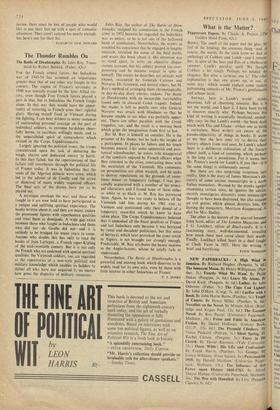The Thunder Rumbles On
FOR the French armed forces, the Indochina war of 1945-54 has assumed an importance
greater than that of any other war fought in this century. The stigma of France's surrender in 1940 was scarcely erased by the later Allied vic- tory, even though Free French forces played a part in that, but in Indochina the French fought alone. In that war they would have the oppor- tunity of restoring to French arms their rightful glory. Having myself lived in Vietnam during the fighting, I can bear witness to many instances of outstanding personal courage on the part of individual soldiers, to extreme hardships cheer- fully borne, to sacrifices willingly made, and to the unparalleled spirit of camaraderie which existed in the Corps Expeditionnaire.
Largely ignoring the political issues, the troops concentrated upon the task of defeating the tough, elusive and dedicated enemy in battle. In this they failed, but the repercussions of that failure still reverberate through the political life of France today. It was in Indochina that the seeds of the Algerian debacle were sown, which led to the advent of de Gaulle and the arrest or dismissal 'of many widely respected officers. The final acts of the drama have yet to be played out.
A mystique envelops the war, and those who fought in it are now held to have participated in a unique and uplifting spiritual experience. The books written about it, and they are many, endow the prominent figures with superhuman qualities and treat them as demigods. A wide gap exists between those who fought in Indochina and those who did not—de Gaulle did not—and it is unlikely to be bridged for many years to come. Anyone who doubts this has only to read the books of Jean Larteguy, a French super-Kipling of the mid-twentieth century. But it is not only the French who are endowed with special spiritual qualities: the Vietminh soldiers, too, are regarded as the repositories of a new-style political and military knowledge which enables its holders to defeat all who have not acquired it, no matter how great the disparity of military resources.
Jules Roy, the author of The Battle of Dien- bienphu, resigned his commission in the French army in 1952 because he regarded the Indochina war as unjust, so he is not one of the hallowed band of combatants. Nevertheless, the events so troubled his conscience that he engaged in lengthy
research, revisited the scene of the final battle, and wrote this book about it. His intention was to stand apart, to write an objective dispas-
sionate account, but his subject proved too over- powering and he became engage in spite of
himself. The events he describes are already well known, recounted by Generals Catroux and. Navarre, Dr. Grauwin, and several others, but M.
Roy's method of arranging them chronologically,
in day-by-day diary entries, endows The Battle of Dienbienphu with an inexorable inevitability
found only in classical Greek tragedy. Indeed, the reader is left to puzzle over why General Navarre was struck with blindness so that he became unable to see what was perfectly appar- ent. There are other parallels with the Greek tragedies, too, and the result is a moving book which grips the imagination from first to last.
But M. Roy is himself an outsider. He is the prisoner of his theme, but he lacks the insight of a participant. In places he falters and his touch becomes unsure. Like some spinsterish and puri- tanical schoolteacher, he voices trite disapproval of the comforts enjoyed by French officers when they returned to the cities, contrasting these with the asceticism of the Vietminh. His comments on personalities are often waspish, and he seeks to destroy reputations on the grounds of some- times minor or temporary failings. I was per- sonally acquainted with a number of the princi- pal characters and I found none of them either so white or so black as M. Roy has portrayed them. Again, he was too ready to believe all the Vietminh told him during his 1961 visit to Vietnam and questioned only their denial of a temporary cease-fire which he knew to have taken place. The Corps Expeditionnaire believed that it embodied all the finest qualities of France and lost Indochina only because it was betrayed by venal and decadent politicians, but this sense of betrayal, which later provoked the army revolt in Algiers, is not brought out strongly enough. Predictably, M. Roy attributes the basest motives to the Anglo-Saxons, whom he totally fails to understand.
Nevertheless, The Battle of Dienbienphu is a powerful and moving book which deserves to be widely read for its own sake, even by those with little interest in either Indochina or France.
P. J. HONEY


































 Previous page
Previous page